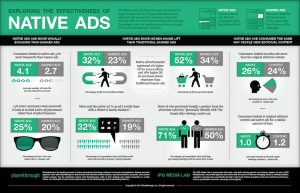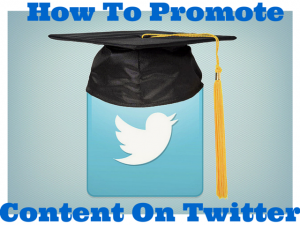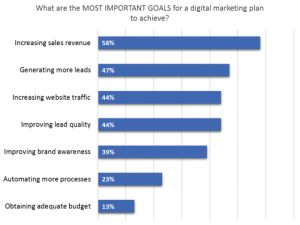Digital technology offers fantastic opportunities for connecting personally and in business – social media is the new coffee break, online marketplaces the new mall. But time spent online can also be a colossal time-suck, and even ruin your reputation. So where does that leave you? And why do we care so much about it?
Let’s start with social media
If your use is strictly personal, you have the luxury of clicking away – if you’re strong enough. If you’re in business, however, it’s getting harder to say no to social:
If you sell anything, it’s a no-brainer – you’ve got to use social platforms to get the word out. Doesn’t matter if you’re an international retail brand, or a local dance studio – people look to social media for information. If your brand isn’t breaking through the noise, they’ll go with the one that is.
Even if social networks don’t directly result in sales, as stated by Internet Retailer, “they provide socially astute retailers unique ways to reach and influence the shoppers they covet the most. And those insights are just as valuable.
If you’re in management, you might be expected to amplify your company’s social presence from your personal accounts – by sharing blog posts and articles, or interacting with influencers to build relationships.
If you’re in the C-suite, there’s a greater expectation for you to be a thought leader for your industry – and social media is part of that.
Even so, many C-suite executives do manage to say no to social media, for fear of saying the wrong thing, according to Forbes’ contributor Kimberly A. Whitler – but they’re sacrificing building their personal brands in the process.
Still, their misgivings are understandable. When using social media, caution and common sense are important.
The speed of social sabotage
Anyone can have an off day, or hit the wrong button – inadvertently posting something that wasn’t meant to see the light of day. The problem with such human slip-ups on social media is someone is always watching.
Even when you quickly delete an ill-advised post, you may not be quick enough to prevent someone from grabbing a screenshot. When you’re a big company especially, being caught making a mistake is too juicy for most people to resist sharing. Just ask DiGiorno, or American Apparel – two recent examples of companies who wish they could have do-overs.
Doing the right thing and apologizing quickly and sincerely – which is what you should do – doesn’t put the genie back in the bottle. It can take a while to recover from a social misstep – so it’s always best not to make one.
And to be sure employees beyond your social marketing team behave as well, a solid social media policy is a must – because social sabotage doesn’t need to escalate to the level of licking tacos to cause a problem.
But even if your social posts don’t get you into trouble, constant connectivity can cause problems in other ways.
Always on – the 24-hour workday
When we extend beyond social to include email and text – we have a new problem. Mobile devices and virtual workplaces have blurred the boundaries of workday beginnings and ends beyond recognition. It’s even worse for global companies, where multiple time zones come into play. Whether they mean to be or not, everyone is always available.
In theory, sending an email whenever the mood strikes seems innocent enough. Just because a client sends an email at midnight – because they’re a night owl – doesn’t necessarily mean they expect an answer then. But for the receiver, there’s an implicit pressure that can be hard to resist. And not reading or answering right away could lead to anxiety about what the start of the next day will entail.
Unless you’re actually essential personnel on-call for the duration, the cure here is establishing clear boundaries and enforcing them. Business Management Daily recommends that management do this, with the reminder that “If you want to protect productivity and morale, you need to also protect employees’ personal time.” Actions could include email bans after 7:00 p.m., and forwarding of emails when employees are on vacation.
The self-employed have to stand up for themselves. With clients or contacts who regularly reach out after business hours, a gentle reminder about when you’re available goes a long way.
For extreme cases, set up an auto-reply speaking to the importance of down time/family time, with a way to get in touch if there is an emergency. You might even inspire that client to take their kid to the park and leave everything else until Monday.
If you’re the one reaching out at all hours, try using a service like Streak to schedule emails to arrive at the start of the next business day – instead of at 1:00 a.m., when something pops into your head while you’re watching Steven Colbert.
Are we addicted to our devices?
It’s probably going to take practice. No one would claim to enjoy working all hours of the day, but reaching for our devices is habitual. And even that groan at seeing a work email pop up can be addictive if you like to complain.
On the other end of the spectrum, there’s something comforting about likes and retweets and comments, which is why social media is so compelling. And there’s no clear data about whether social media, for its part, is good or bad.
Recent studies offer contradictory results, as Sara Kessler recounts at Fast Company: “The more we use Facebook, the worse we feel. Facebook ruins relationships. Facebook makes us feel bad about ourselves. Facebook contributes to eating disorders. Positive emotions spread faster through social networks than negative emotions. Facebook use correlates with ‘life satisfaction, social trust, civic engagement, and political participation.’ Being active on Facebook can make us feel less lonely.”
But American Addiction Centers cautions readers about the role of social media as anyone’s sole support system, “One of the most hotly debated media issues today is whether our rapidly increasing use of social networking might be supplanting face-to-face-interactions and, if so, what the social consequences might prove for us as a culture.”
Social platforms can be a way to enhance our “real life” relationships, but “depending upon them entirely for healthy relationships is not advised or even possible.”
In other words, everyone needs to unplug at some point. The question is – can we?
Digital & Social Articles on Business 2 Community(76)
Report Post





